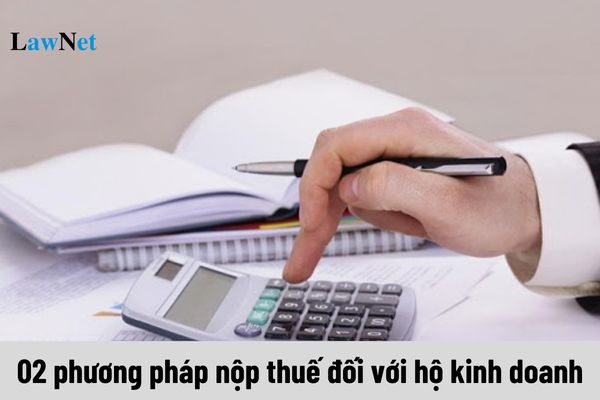What are the two tax payment methods for household businesses in Vietnam?
What are tax calculation principles for household businesses in Vietnam?
Based on Article 4 of Circular 40/2021/TT-BTC, the principles of tax calculation for household businesses and individuals are as follows:
- The tax calculation principles for household businesses and individuals are executed according to current legal regulations on VAT, PIT, and other relevant legal documents.
- household businesses and individuals with revenue from production and business activities in the calendar year of 100 million VND or less are exempted from paying VAT and PIT as per the tax laws.
household businesses and individuals are responsible for declaring taxes accurately, honestly, and completely and submitting tax documents on time; they bear legal responsibility for the accuracy, honesty, and completeness of their tax documents.
- For household businesses and individuals operating as a group or family unit, the revenue threshold of 100 million VND/year to determine the exemption from VAT and PIT is applied to one representative of the group or family unit during the tax calculation year.

What are the two tax payment methods for household businesses in Vietnam? (Image from the Internet)
What are the two tax payment methods for household businesses in Vietnam?
According to the regulations of Circular 40/2021/TT-BTC, household businesses can choose one of the following tax payment methods:
First, Declaration Method
Based on Clause 3, Article 3 of Circular 40/2021/TT-BTC: The declaration method is a tax declaration and calculation method based on the percentage of actual revenue arising monthly or quarterly.
As per Clause 1, Article 5 of Circular 40/2021/TT-BTC, household businesses submitting tax via the declaration method are regulated as follows:
(i) The declaration method is applied to the following subjects:
- Large-scale household businesses and individuals.
- household businesses and individuals that do not yet meet the large-scale criteria but choose to pay tax via the declaration method.
(ii) household businesses using the declaration method file tax monthly unless they are new to the business or meet criteria for quarterly declarations and opt for quarterly declarations as per Article 9 of Decree 126/2020/ND-CP.
(iii) household businesses using the declaration method with inaccurately assessed revenues will have the tax authority adjust taxable revenue as per Article 50 of the Tax Administration Law 2019.
(iv) Those using the declaration method must adhere to accounting policies, invoices, and records. However, if a business can confirm its revenue through appropriate government agencies, it may bypass accounting policies.
(v) household businesses and individuals using the declaration method are exempt from tax finalization.
Second, Presumptive Method
According to Clause 7, Article 3 of Circular 40/2021/TT-BTC and Clause 1, Article 7 of Circular 40/2021/TT-BTC (amended by Clause 1, Article 1 of Circular 100/2021/TT-BTC), the presumptive method is defined for household businesses as follows:
(i) Presumptive method calculates tax based on the set percentage of presumptive revenue determined by the tax authority according to Article 51 of the Tax Administration Law 2019.
(ii) This method is applied to household businesses and individuals not eligible for the declaration method or per-transaction tax payment.
(iii) household businesses (Presumptive) under this method are exempt from accounting policies. If utilizing government-issued invoices, they must keep and present invoices, records, contracts, and proof of legitimate goods/services when requesting invoice issuance.
For those trading in border markets, ports, or economic zones within Vietnam, storage of invoices and proof of legal goods is required for government inspection.
(iv) Households informed of their presumptive tax amount at the year's start must pay accordingly. If ceasing or pausing operations during the year, tax adjustments are made as per points b.4, b.5, clause 4, Article 13 of Circular 40/2021/TT-BTC.
New businesses operating less than 12 months within a calendar year, earning over 100 million VND, must pay VAT and PIT; those earning 100 million VND or less are exempt.
(v) Presumptive households file annual tax returns per point c, clause 2, Article 44 of the Tax Administration Law 2019 and pay taxes by deadlines on the tax authority's payment notices per clause 2, Article 55 of the same law.
Using tax authority-issued invoices on a per-number basis necessitates separate tax filings for each transaction.
Where and how to pay taxes in Vietnam?
According to Article 56 of the Tax Administration Law 2019, the regulations on where and how to pay taxes are as follows:
Location and Means of Tax Payment
1. Taxpayers remit taxes to the state budget as follows:
a) At the State Treasury;
b) At the tax authority where the tax filing is processed;
c) Through a tax collection organization authorized by the tax authority;
d) Through commercial banks, credit institutions, and service organizations as regulated by law.
2. The State Treasury, commercial banks, credit institutions, and service organizations are responsible for arranging locations, facilities, officials, and staff to facilitate taxpayer convenience in promptly paying taxes into the state budget.
3. Organizations receiving tax payments or withholding taxes must issue a tax receipt to the taxpayer.
4. Within 8 working hours of collecting the tax, receiving organizations must remit the funds to the state budget. For cash collections in remote, isolated, or challenging regions, the Finance Minister sets the deadline for fund remittance into the state budget.
Therefore, taxpayers may directly pay taxes at the State Treasury, the tax authority where tax reports are submitted, or through organizations authorized by the tax authority to collect taxes.
Additionally, tax payments can be made through commercial banks, other credit institutions, and service organizations according to the law.

